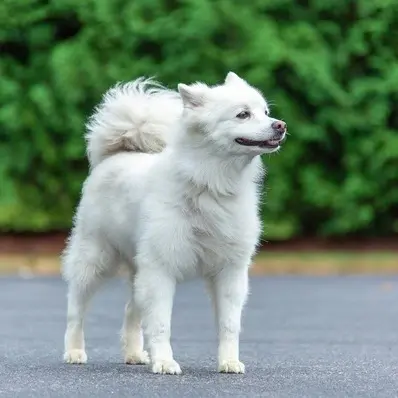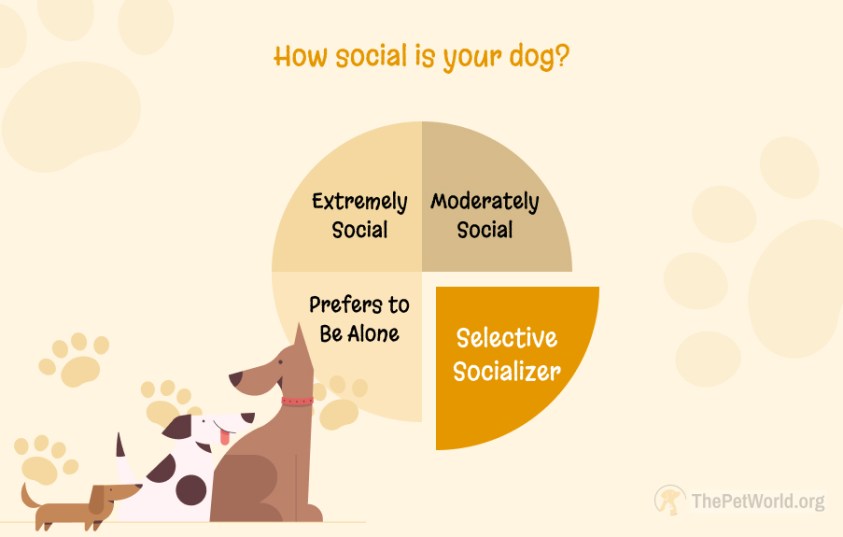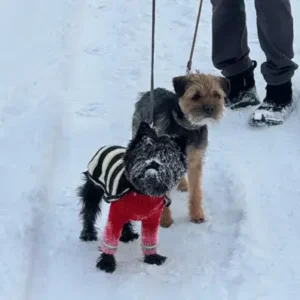American Eskimo History/Origin
The American Eskimo dog breed has a fascinating backstory that starts with its ancestors, the Spitz family. These purebred dogs are originally from the Nordic regions and are known for their fox-like faces, fluffy coats, and perky ears. From tiny Pomeranians to big Samoyeds, Spitz dogs come in all sizes.
Tiny Pomeranian- Source: Britannica
Big Samoyeds-Source: mr__tenchi
The exact beginnings of the American Eskimos are a bit of a mystery. But we do know that small, white Spitz-type dogs were common in German immigrant communities in the United States. These furry pals likely came over with their German families from Europe and were called American Spitz dogs.
In the 1800s, these dogs became stars in traveling circuses across America. With their dazzling white fur and clever tricks, they stole the show wherever they went. People couldn’t get enough of them, and their popularity soared.
In 1917, the German Spitz got a new name: the American Eskimo. This change is believed to be a result of anti-German sentiment during World War I.
Fast forward to 1985, when the American Eskimo Dog Club of America was formed. This group was all about celebrating and protecting the breed. Then, in 1995, the American Kennel Club officially recognized the American Eskimo as part of their Non-Sporting Group.
American Eskimo Personality
American Eskimo is one of the dog breeds that are known for their intelligence, playfulness, and loyalty. They are affectionate and devoted to their families, making them excellent companions.
Their natural wariness of strangers makes them excellent protectors of their homes and loved ones. Despite this, they are friendly and social with familiar faces.
- American Eskimo Dog Temperament
In terms of temperament, Eskies are known for their lively and outgoing nature. They enjoy spending time with their humans, whether it’s playing games or simply lounging around.
Some American Eskimos may even suffer from separation anxiety, causing them to show destructive behaviors when left alone for too long.
However, they are extremely trainable dogs and excel in agility and obedience training. Overall, they are loving and attentive pets that bring joy to their families with their charming personalities.
- A Tendency Toward Separation Anxiety
The American Eskimo Dog needs mental and physical stimulation to maintain interest and stay out of trouble. An under-exercised or under-challenged Eskie may become destructive in the home or yard or begin barking excessively. Alone time can trigger separation anxiety in some Eskimos, leading to distress and undesirable behaviors when left by themselves.
American Eskimo Physical Appearance
American Eskimos are a sight to behold, with their fluffy mane, fox-like face, expressive eyes, and plumed tail.
In terms of body structure, American Eskimos are well-balanced and proportioned. They have a sturdy build with a level topline and a well-developed chest. Their legs are straight and muscular, giving them the agility and grace to move with ease.
- Size
The breed’s standard size is considered to be a medium dog. The typical American Eskimo dog weight lies between 18 to 30 pounds. They are categorized into three distinct sizes: Toy, Miniature, and Standard.
Toy: Toy or teacup American Eskimo Dogs stand between 9 to 12 inches at the shoulder and typically weigh between 6 to 10 pounds on average.
Toy American Eskimo- Source: Wikipedia
Miniature: Mini American Eskimo Dogs are slightly larger, standing between 12 to 15 inches at the shoulder and weighing around 10 to 20 pounds on average.
Miniature American Eskimo- Source: AKC.org
Standard: Standard American Eskimo Dogs are the largest of the three sizes. They are standing between 15 to 19 inches at the shoulder and weighing approximately 18 to 35 pounds on average.
Standard American Eskimo -Source: Pinterest
- Coat color
Their most notable feature is their plush double coat, which is thick and luxurious to the touch.
This coat comes in a striking white or biscuit cream color, adding to its regal and majestic appearance. The contrast between their coat and dark eyes gives them an expressive and captivating look.
American Eskimo Gender Differences
Male Eskies typically have a thicker and denser coat compared to females. Their undercoat is softer and thicker, providing additional warmth and insulation.
Males often develop a noticeable mane or thicker collar of fur around their necks, adding to their regal appearance.
In contrast, female American Eskimos may have a lighter and less dense coat, although they still possess the characteristic double coat of the breed.
Despite these differences in coat thickness and mane development, both male and female Eskies share similar physical traits and temperament. They are affectionate, intelligent companions known for their loyalty and playful nature.
American Eskimo Feed/Nutrition
Proper nutrition is vital for the health of your American Eskimo. They typically require 1/2 to 1.5 cups of high-quality dry food per day, divided into two meals, adjusted based on factors like size, age, and activity level.
Just like humans, dogs have individual dietary needs, with active dogs requiring more food than sedentary ones. Including healthy treats like carrots and cantaloupe for dogs can provide additional hydration and antioxidants, but they should be given in moderation. Go for premium dog food to ensure your pet receives essential nutrients and avoid overfeeding to prevent obesity.
Monitoring their weight and adjusting food portions accordingly helps maintain their health and vitality over time.
American Eskimo Health Problems
Like all breeds, they are prone to certain health issues, such as:
- Hip Dysplasia: Hip dysplasia is a common orthopedic condition in dogs where the hip joint doesn’t develop properly. This can lead to discomfort, lameness, and arthritis as the dog ages. Regular hip evaluations are crucial to detecting and managing this condition early.
- Progressive Retinal Atrophy (PRA): Progressive retinal atrophy is an inherited eye disorder that gradually leads to vision loss and eventual blindness. It affects the retina, causing degeneration over time. Regular eye exams by a veterinarian can help monitor the progression of PRA and provide appropriate management strategies.
- Legg-Calve-Perthes Disease: Legg-Calve-Perthes disease is a condition that affects the hip joint, leading to the degeneration of the femoral head. This results in pain, limping, and decreased mobility. Surgery may be necessary to alleviate discomfort and improve the dog’s quality of life.
- Juvenile Cataracts: Juvenile cataracts are opacities in the lens of the eye that typically develop in young dogs. They can impair vision and lead to blindness if left untreated. Surgical intervention may be required to remove cataracts and restore vision in affected dogs.
Regular veterinary check-ups are crucial for early detection and management of these health conditions, ensuring the well-being and longevity of Eskies.
American Eskimo Care and Grooming
Regular grooming is essential for maintaining the health and appearance of the American Eskimo’s double coat.
Their fur coat naturally has oils that prevent dirt from sticking, making it easy to brush and clean. Routine brushing several times a week helps prevent mats and tangles, and rushing is usually enough to remove dirt unless it gets exceptionally dirty.
Bathing should be done as needed, depending on their level of dirtiness, as frequent bathing can strip their skin of natural oils, leading to dryness and irritation.
Additionally, regular dental care, including brushing their teeth and providing dental treats, is essential for oral health. Routine nail trimming, ear cleaning, and trimming of their coat will help keep your Eskies healthy and comfortable.
For dog training tips, make sure to start training early and be consistent to ensure good behavior and obedience.
American Eskimo Price
The average American Eskimo dog price ranges from $1000 to $2000, but it may vary on the breeder. When purchasing an American Eskimo, it’s crucial to buy from a reputable breeder who prioritizes the health and well-being of their dogs.
American Eskimos Rescue Group
Several rescue groups specialize in the adoption and rehabilitation of American Eskimos. These organizations provide a second chance for dogs in need of loving homes. Consider adoption as an option when looking to add an American Eskimo to your family.
Interesting Facts
- When they arrived in the U.S. they became popular as circus performers! This was because of their intelligence, agility, and easy-to-train nature.
- Eskies are believed to be the first dogs ever to walk on a tightrope. In the 1930s, an Eskimo named Stout’s Pal Pierre walked a tightrope in Barnum and Bailey Circus.
Best For
American Eskimos excel as family pets and companions. They thrive in homes where they receive plenty of love, attention, and mental stimulation. Their alert nature also makes them excellent watchdogs.
Top Names
| Male American Eskimo Names | Female American Eskimo Names |
| Kodiak | Freya |
| Loki | Nova |
| Finn | Winter |
| Apollo | Nala |
| Orion | Juno |









 Tiny Pomeranian- Source:
Tiny Pomeranian- Source:  Big Samoyeds-Source:
Big Samoyeds-Source: 
 Toy American Eskimo- Source:
Toy American Eskimo- Source:  Miniature American Eskimo- Source:
Miniature American Eskimo- Source:  Standard American Eskimo -Source:
Standard American Eskimo -Source: 








